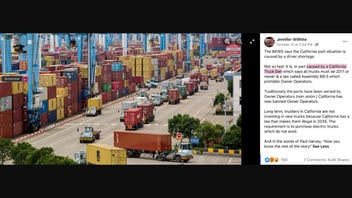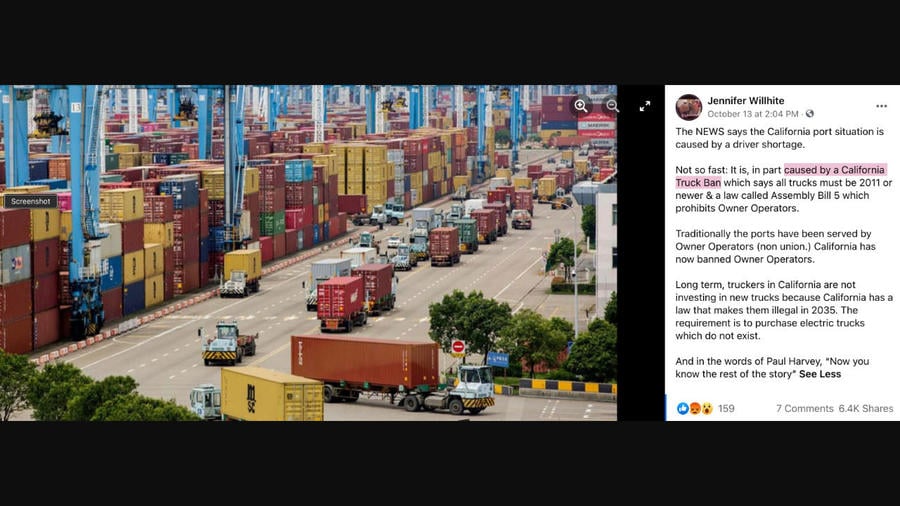
Is the October 2021 backlog of cargo ships off Los Angeles' harbors caused by the "California truck ban"? No, that is not true: Multiple organizations in the supply chain have confirmed the long wait times at the Los Angeles and Long Beach ports are due to a shortage of drivers, a burst of global shipping and other factors. The truck emissions restrictions proposed in California are not all in effect when shippers are having a hard time getting inventory moved to shore and then onto the road for delivery.
"There is simply no evidence to support any claims that the current congestion at our ports has any connection to the state's efforts to clean up California's trucks," the communications director with the California Air Resources Board told Lead Stories.
There is not one single cause for the log jam. The backlog at the ports in Los Angeles is a result of multiple factors, including supply chain problems, reaction to a global slowdown during the COVID-19 pandemic, an increase in consumer demand and truck driver availability, as Lead Stories previously reported.
The claim appeared in a Facebook post (archived here) on October 13, 2021. It opens:
The NEWS says the California port situation is caused by a driver shortage.
Not so fast: It is, in part caused by a California Truck Ban which says all trucks must be 2011 or newer & a law called Assembly Bill 5 which prohibits Owner Operators.
This is what the post looked like on Facebook at the time of writing:
 (Source: Facebook screenshot taken on Fri Oct 15 23:19:38 2021 UTC)
(Source: Facebook screenshot taken on Fri Oct 15 23:19:38 2021 UTC)
The post reads in full:
The NEWS says the California port situation is caused by a driver shortage.
Not so fast: It is, in part caused by a California Truck Ban which says all trucks must be 2011 or newer & a law called Assembly Bill 5 which prohibits Owner Operators.
Traditionally the ports have been served by Owner Operators (non union.) California has now banned Owner Operators.
Long term, truckers in California are not investing in new trucks because California has a law that makes them illegal in 2035. The requirement is to purchase electric trucks which do not exist.
Stanley Young, communications director with the California Air Resources Board, emailed Lead Stories on October 15, 2021, and explained why the claim is false:
96% of trucks serving California's major ports are already compliant with the state's Truck and Bus Regulation. Also, note that the twin ports of Los Angeles and Long Beach themselves have even stricter requirements banning older, dirty trucks from entering, that have been in effect since about 2014. You can view them here: Port of Los Angeles Clean Truck Program and Port of Long Beach Clean Truck Program. So CARB's Truck and Bus regulation has not impeded any trucks from serving these ports - the biggest in the country when combined.
Young expanded on the Truck and Bus Regulation:
The California Department of Motor Vehicles can only register trucks that are in compliance with the Truck and Bus Regulation. The rule calls for the vast majority of trucks, including those that service the ports, to have a 2010 or newer engine by 2023. As of this year, 2021, only trucks with engines older than 2005 would have their registration denied. So any truck with a 2007 or newer engine is currently in compliance with the regulation. If you want to get into the weeds here to see engine model years and compliance deadlines, see page 4 of this booklet: A Guide to California's Clean Air Regulations for Heavy-Duty Diesel Vehicles."
The Facebook post asserts, "Long term, truckers in California are not investing in new trucks because California has a law that makes them illegal in 2035. The requirement is to purchase electric trucks which do not exist in large numbers and are constrained by their short range."
Young told Lead Stories:
This comment relates to port truck requirements that we are considering bringing to the Board next year for their review. They are still under development. This is not a contributing factor to the current congestion at the ports.
The Facebook post claims another reason for the backup is "a law called Assembly Bill 5 which prohibits Owner Operators. Traditionally the ports have been served by Owner Operators (non union.) California has now banned Owner Operators." Lead Stories reached out to California Assemblymember Lorena Gonzalez, the author of the bill, for comment and will update the story when a response is received.
Trucker organizations are closely watching a lawsuit over AB5, which changed the rules for companies that rely on "independent" gig workers, companies like Uber, Lyft and DoorDash. Courts have found it may also apply to owner-operators of cargo trucks.


















